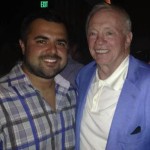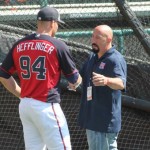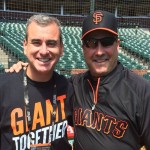There seems to be two schools of thought when it comes to creating content, and performing as a sports talk radio personality.
On one side you have the talk show host who’s not emotionally attached to their market’s local teams, analyzes stories from a neutral point of view, and cares more about the creation of good content and interesting storylines, than the success or failure of the local franchises. At times they can be accused by the audience of being cynical or negative, and they value their credibility and integrity, and will stop at nothing to defend it.
On the other side, you have the talk show host who lives and dies with their team’s results and daily decisions. They watch every game because they genuinely love the franchise, and each day’s outcome tugs on their heartstrings. They go to the stadium as much as possible, forming as many relationships as they can, and they openly acknowledge their rooting interest with the audience. That often leads to being accused of being too positive and soft (homers), which calls into question their objectivity, whether it’s warranted or not.
While each person has their own personal preferences, both approaches work. Audiences are made up of people from many different backgrounds, with multiple views, and as long as the individual providing the content delivers their dialogue in an authentic way, and is willing to be open and honest with the audience, they’ll be accepted for who they are.
Some listeners put on the radio to hear a host who loves the local team as much as they do, because they want to feel good about their favorite players, hear interviews with members of the local organizations, and they want someone to pump them up for the next game.
Then there are listeners who are mentally stimulated by negative discussions built about what’s wrong with the local team, and who should pay for the team’s failure. The local team could win a championship, and the next day their more concerned about which members of the team will leave via free agency, rather than celebrating.
 That got me to wondering, do we gain more listeners and higher ratings by being detached from our fandom, or by embracing it? It seems the older we get, the more cynical we become, and we spend less time watching games, and rooting for storylines over victories. But does that matter to the audience? Should it?
That got me to wondering, do we gain more listeners and higher ratings by being detached from our fandom, or by embracing it? It seems the older we get, the more cynical we become, and we spend less time watching games, and rooting for storylines over victories. But does that matter to the audience? Should it?
We’re in the sports talk radio business. The key word being “business“. The job is to present angles, opinions, insight, and information, and make it compelling enough to entertain an audience. The job description doesn’t say “one must passionately care about our teams and form a bond with them that becomes ever lasting“.
However, when a listener puts on a sports radio station, they expect that they will hear a conversation about sports. Many of us though don’t always provide that. Instead we venture into discussions about our favorite foods, favorite television shows, best concerts we’ve attended, and other lifestyle focused topics.
 I’ve often found that those who take this approach, are usually more detached from their fandom, and the local teams. Yet they are passionate about what they’re discussing, and you can argue that the subject matter has broader appeal. In many cases the ratings go up when personalities let the audience in on their other views and personal interests. But is this content being created for the audience, or because we aren’t as interested in sports as maybe we should be?
I’ve often found that those who take this approach, are usually more detached from their fandom, and the local teams. Yet they are passionate about what they’re discussing, and you can argue that the subject matter has broader appeal. In many cases the ratings go up when personalities let the audience in on their other views and personal interests. But is this content being created for the audience, or because we aren’t as interested in sports as maybe we should be?
For those who are more in touch with their fandom, they’re usually eager to dive into a sports discussion. Sure they’ll touch on other aspects of life too, but sports is the center of their universe. They dedicate the majority of their show to it, and they don’t have to manufacture enthusiasm to get into a conversation about their local teams.
 I’ve been in numerous markets and seen both styles work well. I recall working in Philadelphia in 2006, and WIP morning host Angelo Cataldi was open with his audience about not attending games, and forming relationships with players, because he felt it could compromise his judgement. I don’t remember the exact quote but it was along the lines of “My job isn’t to make friends in locker rooms or break news. I’m here to share my honest opinions, and look out for my audience”.
I’ve been in numerous markets and seen both styles work well. I recall working in Philadelphia in 2006, and WIP morning host Angelo Cataldi was open with his audience about not attending games, and forming relationships with players, because he felt it could compromise his judgement. I don’t remember the exact quote but it was along the lines of “My job isn’t to make friends in locker rooms or break news. I’m here to share my honest opinions, and look out for my audience”.
By staying out of the room, Angelo felt he was in a better position to serve his listeners. I knew exactly where he was coming from, and because it was consistent with who he was as a personality, his audience accepted it.
On the other hand, I’ve watched in St. Louis and San Francisco, how guys like Randy Karraker, Bernie Miklasz, Chris Dimino and Brian Murphy, have utilized their time around local teams to gain added perspective, inside information, and form relationships with organizations which has given the audience a better understanding of how teams think and operate. They too have stayed true to who they are as people, and their approach has resonated with their audiences.
 If there’s one thing that is vital for all talk show hosts, regardless of whether or not they’re fans, it’s to be willing to criticize and engage in difficult conversations. It’s not easy delivering an opinion, and knowing that it can damage a relationship, but if you’re focused on serving the audience (your true employer), then you’ve got to do what’s best for them. It’s ok to root for your team, and lean towards positive content, but when bad things happen, you’ve got to address them. Avoiding them compromises your credibility and integrity.
If there’s one thing that is vital for all talk show hosts, regardless of whether or not they’re fans, it’s to be willing to criticize and engage in difficult conversations. It’s not easy delivering an opinion, and knowing that it can damage a relationship, but if you’re focused on serving the audience (your true employer), then you’ve got to do what’s best for them. It’s ok to root for your team, and lean towards positive content, but when bad things happen, you’ve got to address them. Avoiding them compromises your credibility and integrity.
To gain further insight into this discussion, I reached out to a number of personalities across the country, who face this challenge on a daily basis. I wanted to get a sense of how they manage their fandom and objectivity, why they approach their programs the way they do, what they believe matters most to sports radio listeners, and what type of talent they’d feature on their stations if they made the final decision. I think you’ll enjoy their answers.
Special Guests:
- Mo Egger– ESPN 1530 in Cincinnati
- Shan Shariff-105.3 The Fan in Dallas
- Chris Dimino–680 The Fan in Atlanta
- John Kincade-680 The Fan in Atlanta
- Randy Karraker-101 ESPN in St. Louis
- Nick Wright-Sports Radio 610 in Houston
- Brian Murphy-KNBR 680 in San Francisco
- Chad Doing-95.7 The Game in San Francisco
What does the term “homer” mean to you?
 Karraker: The general perception is of someone that won’t challenge the front office of the local teams and won’t criticize. But to me a “homer” is someone that pays intense attention to the teams in his home market, and has the same emotional investment in those teams as the people listening. Being a fan is being part of a community, of shared interest in your team. There’s no question that when I come on the air, I have an emotional investment in the Cardinals, Rams and Blues, and like most fans, I’m capable of being objective and critical. I don’t blindly agree with everything the franchise is doing, I just want them to succeed like my listeners do.
Karraker: The general perception is of someone that won’t challenge the front office of the local teams and won’t criticize. But to me a “homer” is someone that pays intense attention to the teams in his home market, and has the same emotional investment in those teams as the people listening. Being a fan is being part of a community, of shared interest in your team. There’s no question that when I come on the air, I have an emotional investment in the Cardinals, Rams and Blues, and like most fans, I’m capable of being objective and critical. I don’t blindly agree with everything the franchise is doing, I just want them to succeed like my listeners do.
Murphy: A “homer” is a fan who is blind to reality. They refuse to see their team’s shortcomings, often to the point of irrationality.
 Doing: I think of a local broadcast team that will never criticize the play of the team they work for regardless of the performance of the franchise. In relation to sports talk, I think of a local host who is a fan of the teams in the city that he/she works. I don’t think that’s necessarily a negative.
Doing: I think of a local broadcast team that will never criticize the play of the team they work for regardless of the performance of the franchise. In relation to sports talk, I think of a local host who is a fan of the teams in the city that he/she works. I don’t think that’s necessarily a negative.
Kincade: It’s the blatant inability to talk about a team in honest fashion. It is the trademark of a host that wants to pander to the locals. They desire to be loved, not willing to earn respect for fair evaluations.
 Egger: “Homer,” when applied to a host means that he/she is someone who allows their rooting interest to influence their opinions and willingness to criticize, often at the expense of the listener. Homers placate the lowest common denominator of an audience, and usually alienate their smartest, most savvy audience members. A good sports-radio host, whether they’re fans of the local teams or not, always has the backs of the fans. Homers place the teams (often times, they’re in a relationship with the teams) ahead of fans.
Egger: “Homer,” when applied to a host means that he/she is someone who allows their rooting interest to influence their opinions and willingness to criticize, often at the expense of the listener. Homers placate the lowest common denominator of an audience, and usually alienate their smartest, most savvy audience members. A good sports-radio host, whether they’re fans of the local teams or not, always has the backs of the fans. Homers place the teams (often times, they’re in a relationship with the teams) ahead of fans.
How does it make you feel if a listener refers to you as a homer?
 Shariff: If someone calls me a Jerry Jones homer, I don’t get upset because it’s true. We all have natural bias and I don’t see anything wrong in acknowledging it. If someone calls me a Cowboys homer because we’re the flagship, I try to correct that perception. I don’t like someone thinking my opinion is formed because of other factors outside of what I see and feel.
Shariff: If someone calls me a Jerry Jones homer, I don’t get upset because it’s true. We all have natural bias and I don’t see anything wrong in acknowledging it. If someone calls me a Cowboys homer because we’re the flagship, I try to correct that perception. I don’t like someone thinking my opinion is formed because of other factors outside of what I see and feel.
Kincade: I can honestly say on-air in Atlanta since 1995 I have never been referred to as a homer. I far prefer to be known as the guy willing to tell you that your baby is ugly when deserved.
 Dimino: The initial reaction for most hosts is defensive. It becomes credibility being questioned. I have been honest about liking some guys and teams and front offices more than others. But I’ve dealt that from the top of the deck. I also made a conscious decision years ago that I have to sleep at night, and in our job that means you better believe it before you say it, and more after you say it. Your body of work speaks more than any isolated incident.
Dimino: The initial reaction for most hosts is defensive. It becomes credibility being questioned. I have been honest about liking some guys and teams and front offices more than others. But I’ve dealt that from the top of the deck. I also made a conscious decision years ago that I have to sleep at night, and in our job that means you better believe it before you say it, and more after you say it. Your body of work speaks more than any isolated incident.
Doing: It’s never bothered me. I want my listeners to know that I embrace my local surroundings, and that I’m going to root for the teams in the town in which I work. In my mind, I can be a “homer” while still being objective. I’m going to celebrate when they win, but when they don’t perform, I’m going to be critical.
 Karraker: I have no problem with being called a homer. Jack Buck once told me that a listener had called him a Cardinal homer, and his reply was “what do you want me to do, root for the Padres?” Many times, people will hear what they want to, rather than what reality is. I’d actually rather be called a homer than a hater.
Karraker: I have no problem with being called a homer. Jack Buck once told me that a listener had called him a Cardinal homer, and his reply was “what do you want me to do, root for the Padres?” Many times, people will hear what they want to, rather than what reality is. I’d actually rather be called a homer than a hater.
Shouldn’t the audience want to hear a host who lives & dies with the same teams as they do and is proud to admit it?
 Wright: The audience should want to hear a host who is honest and transparent. If that host truly lives and dies with the local teams, then they shouldn’t hide it, but the worst thing a host can do is fake that loyalty. The audience can sniff that out.
Wright: The audience should want to hear a host who is honest and transparent. If that host truly lives and dies with the local teams, then they shouldn’t hide it, but the worst thing a host can do is fake that loyalty. The audience can sniff that out.
Shariff: Depends how interested you are in the truth. I had many listeners in Kansas City who recognized their own bias and wanted to hear an objective view of their favorite teams. I do think you better cover every facet of your city’s favorite teams with as much passion as possible.
 Murphy: Every show is different, and every host has a different voice and vibe. Some make their living being cynical, and that appeals to listeners. Some (me included) wear their heart on their sleeve, and allow the listeners to judge us for who we are.
Murphy: Every show is different, and every host has a different voice and vibe. Some make their living being cynical, and that appeals to listeners. Some (me included) wear their heart on their sleeve, and allow the listeners to judge us for who we are.
Dimino: If you’re going to have your fandom, own it. This isn’t soup at a restaurant. The “Fan of the Day” shit is much worse than living and dying with your teams. Secondly, it better be genuine. Don’t bandwagon it. Listeners can smell that a mile away. You better save the rants for rant like moments. The overly negative “homer” exists and I can play the glass is empty with the best of them. But killing teams and people just to kill can get old. I want parades in my town, I want our teams talked about nationally, and I like seeing our team’s games on national television in the postseason. I’m unabashed and unapologetic about those things.
 Kincade: You can do that! I’ve worked with a few guys that are huge fans of the local teams, but still will criticize when warranted. They are far more credible to me than the guys who prefer to kiss butt so they will be liked by the local teams. If the audience prefers a homer, they tend to be caller driven pep rally shows. I turn those off quickly.
Kincade: You can do that! I’ve worked with a few guys that are huge fans of the local teams, but still will criticize when warranted. They are far more credible to me than the guys who prefer to kiss butt so they will be liked by the local teams. If the audience prefers a homer, they tend to be caller driven pep rally shows. I turn those off quickly.
How important do you believe it is for a host on a local sports station to be interested in & passionately & emotionally involved in the success & failure of the local sports teams they cover?
 Dimino: It’s huge because success and failure drive conversation. From a business point of view, I root for storylines. I want ultimate successes or total disasters. Anyone who elicits no reaction is death. I don’t root for horrible but if that’s what it is or becomes, that drives conversation. “What needs to be done” talk is even more interesting and passionate than the ones about first place teams.
Dimino: It’s huge because success and failure drive conversation. From a business point of view, I root for storylines. I want ultimate successes or total disasters. Anyone who elicits no reaction is death. I don’t root for horrible but if that’s what it is or becomes, that drives conversation. “What needs to be done” talk is even more interesting and passionate than the ones about first place teams.
Wright: I think a local host absolutely must be interested and passionate about the teams in their market, but does not need–at all–to be emotionally invested in order to be successful.
 Doing: Like my listeners, I am a sports fan. So, I want to be able to relate to them and feel what they feel. I accomplish that by choosing to become invested in the teams I cover. Once I get around the players, I create relationships and learn more about them, so that I eventually begin to pull for them as individuals. When I do this, I naturally become emotionally invested in them and my passion for them is genuine.
Doing: Like my listeners, I am a sports fan. So, I want to be able to relate to them and feel what they feel. I accomplish that by choosing to become invested in the teams I cover. Once I get around the players, I create relationships and learn more about them, so that I eventually begin to pull for them as individuals. When I do this, I naturally become emotionally invested in them and my passion for them is genuine.
Shariff: Interested? Hell yes. Passionate? Absolutely. Emotionally involved in wins and losses? I don’t believe you have to live and die with every loss, but your audience better have zero doubt that you’re qualified and prepared to dissect their teams.
 Kincade: I came from Philadelphia in 1995. I’ve been on-air here for 20 years, and I have never dropped my hometown team allegiances. I’ve also never hidden it from my audience. I’m honest with them and prefer that the local teams do well. It’s better for the station when they do. My audience knows that I watch the teams and am prepared to get into conversation about them every day. It allows me to be a different voice. As long as I have been fair, the audience respects you for your talents and insights.
Kincade: I came from Philadelphia in 1995. I’ve been on-air here for 20 years, and I have never dropped my hometown team allegiances. I’ve also never hidden it from my audience. I’m honest with them and prefer that the local teams do well. It’s better for the station when they do. My audience knows that I watch the teams and am prepared to get into conversation about them every day. It allows me to be a different voice. As long as I have been fair, the audience respects you for your talents and insights.
When a host says “I don’t care if the local team wins or loses, my heart isn’t attached to them. My job is to talk about the story/result and what it means for the audience” – do you think that’s a good or bad thing for the audience?
 Murphy: It depends how well the host conveys that. If it comes off as cold and distant and clinical, surely the host will turn off some listeners. But if it comes off as informative and enriching and instructive, the host will earn respect.
Murphy: It depends how well the host conveys that. If it comes off as cold and distant and clinical, surely the host will turn off some listeners. But if it comes off as informative and enriching and instructive, the host will earn respect.
Dimino: If you don’t care about winning or losing, you’re in the wrong line of work. Your opinions, not final scores, will come from that caring. Your audience can understand 7-4, 28-21 and 104-98. That’s an update. It’s not a conversation. “How and why and what to do about it” IS our business. This idea that being a fan is a bad thing is ridiculous. It’s why you got the job. It’s what most of us have been preoccupied with since 6th grade study hall. If you can’t feel the ups and downs, why should anyone care what you think or believe?
 Karraker: As a consumer, I don’t want to listen to a host who doesn’t care whether the local team wins or loses. If he says that privately, that’s fine. And if the host can talk about the story and analyze the result without caring, I don’t think that’s necessarily bad for the audience. However, sports fans care deeply about their teams. Any time we care about something, and the person we’re talking to says they don’t care about it, it’s going to affect that relationship.
Karraker: As a consumer, I don’t want to listen to a host who doesn’t care whether the local team wins or loses. If he says that privately, that’s fine. And if the host can talk about the story and analyze the result without caring, I don’t think that’s necessarily bad for the audience. However, sports fans care deeply about their teams. Any time we care about something, and the person we’re talking to says they don’t care about it, it’s going to affect that relationship.
Egger: As a whole, I don’t think the audience is looking for either. There are fans who clearly prefer a host who’s as attached to their teams as they are, but I think the majority of listeners are looking for content that’s entertaining, smart, curious, and relatable. If the host is a fan, he/she has a responsibility to be objective at times. If they’re not, they have to at least understand and convey an understanding that these teams and their fortunes do matter to their audience.
 Kincade: That is a horrible thing to say. You have to care about the teams and their performances. Even if you care just to create great conversation, you better garner passion for yourself and your listeners!
Kincade: That is a horrible thing to say. You have to care about the teams and their performances. Even if you care just to create great conversation, you better garner passion for yourself and your listeners!
How possible is it to be a homer in a local market if the on-air talent isn’t from the area?
 Shariff: In my experience, you lose some rooting interest in your favorite teams the longer you do this job. My DFW motto has been “I root for ratings” and I’ve said that many times to our audience. The Cowboys and Rangers winning helps our ratings and my wallet. Why wouldn’t I become emotionally invested in their success? Personal relationships are also a factor. A major reason I root for the Cowboys success is Jerry Jones, Jason Garrett, Witten, Romo, Sean Lee and Tyron Smith. We’re not best friends, but I believe they do things the right way and I root for that. With all that said, I think it’s important to be genuine. People are instinctive and smart. They know if you’re being fake or feeding them what you think they want to hear.
Shariff: In my experience, you lose some rooting interest in your favorite teams the longer you do this job. My DFW motto has been “I root for ratings” and I’ve said that many times to our audience. The Cowboys and Rangers winning helps our ratings and my wallet. Why wouldn’t I become emotionally invested in their success? Personal relationships are also a factor. A major reason I root for the Cowboys success is Jerry Jones, Jason Garrett, Witten, Romo, Sean Lee and Tyron Smith. We’re not best friends, but I believe they do things the right way and I root for that. With all that said, I think it’s important to be genuine. People are instinctive and smart. They know if you’re being fake or feeding them what you think they want to hear.
Karraker: It’s very possible. Our morning guy, Bernie Miklasz, came to St. Louis from Baltimore in 1984. He grew up a big Colts and Orioles fan, but he’s been around St. Louis for such a long time, that he wants to see the hometown teams succeed. He developed an emotional tie to the city and the teams. He’s my version of a homer. He wants to see our teams do well, but is objective and willing to point out problems even for winning teams. Secondly, if you get to a town and do your job, you’re going to develop relationships that cause you to root for individuals. I became a huge Arizona Cardinals fan when Kurt Warner went there. He’s one of the finest people I’ve ever met. Any man who meets and gets to know Mike Matheny and understands why he’s successful is going to want him to succeed. So while it might not be the team you grew up with, it’s the team and people you’re with now, and you do develop personal relationships and rooting interests.
 Doing: It’s very possible. I moved to San Francisco last year. In the 12-months I have lived in the Bay Area, I have been to the majority of games for the Giants, Warriors, Raiders, and 49ers. It was a challenge at first, but as I got familiar with the area and began to speak with fans, I started to develop a better understanding of the market I was in. Going to games and interviewing the athletes was the best part of the process for me. For example, the Warriors locker room was filled with high character guys who were easy to root for, and when I combine that with the buzz in the city coming from fans, my conversion process happened at an accelerated rate. But you have to put in the time and commit to going to a number of games.
Doing: It’s very possible. I moved to San Francisco last year. In the 12-months I have lived in the Bay Area, I have been to the majority of games for the Giants, Warriors, Raiders, and 49ers. It was a challenge at first, but as I got familiar with the area and began to speak with fans, I started to develop a better understanding of the market I was in. Going to games and interviewing the athletes was the best part of the process for me. For example, the Warriors locker room was filled with high character guys who were easy to root for, and when I combine that with the buzz in the city coming from fans, my conversion process happened at an accelerated rate. But you have to put in the time and commit to going to a number of games.
Wright: If you happen to be in a market where you’ve always loved the team, despite not being from there (EX: A Lakers fan who is from Kansas City but now works in LA) you can obviously be a homer. Also, if you’ve lived in the area for a long time (10+ years) you can probably become a homer because it becomes your adopted team.
 Egger: I can only speak for my market, because this is the only one I’ve worked in. We are a parochial town, a little wary of outsiders. Some have called Cincinnati the “biggest small town in America,” and I often joke to Cincinnatians, if something doesn’t happen inside the 275 loop (the interstate bypass that circles our city), it doesn’t happen. It’s an uphill battle if you’re a host who isn’t from here, especially since the most successful talents in this city so rich in broadcast history have been from Cincinnati. If you come to Cincinnati to talk sports for a living, you better do some work. Recite what the Reds did in the 70s. Familiarize yourself with why the Bengals haven’t won a playoff game in a quarter-century. Understand the depths of the many regional college rivalries. These things matter here. Maybe more than other markets.
Egger: I can only speak for my market, because this is the only one I’ve worked in. We are a parochial town, a little wary of outsiders. Some have called Cincinnati the “biggest small town in America,” and I often joke to Cincinnatians, if something doesn’t happen inside the 275 loop (the interstate bypass that circles our city), it doesn’t happen. It’s an uphill battle if you’re a host who isn’t from here, especially since the most successful talents in this city so rich in broadcast history have been from Cincinnati. If you come to Cincinnati to talk sports for a living, you better do some work. Recite what the Reds did in the 70s. Familiarize yourself with why the Bengals haven’t won a playoff game in a quarter-century. Understand the depths of the many regional college rivalries. These things matter here. Maybe more than other markets.
If you were the program director of a radio station and trying to satisfy the desires of the local audience, would you put more people on the air who are more or less emotionally attached to the local teams?
Dimino: Hosts and radio stations are not widgets. Everything being the same serves no one. It’s what creates chemistry inside a show and weaves the fabric of the station. Emotionally attached does not for a second imply marching in step with some manifesto of rainbows and smoke blown up asses. It rides good and bad time waves and relatability with an audience. The trickier part is the “Rights Holders” aspect of this. Do you have the freedom to speak your mind? Do you get blowback from management or the teams themselves if you criticize? If I was PD I want genuine. The guy attempting to figure out which way the wind is blowing daily will be rooted out by smart listeners.
 Wright: I would have locality be the only tiebreaker in selecting talent. I would try to build the best team possible and let the chips fall where they may.
Wright: I would have locality be the only tiebreaker in selecting talent. I would try to build the best team possible and let the chips fall where they may.
Murphy: I think a balance is probably best. And I think it’s important for hosts to be themselves. I think audiences can smell a phony. I think they like hosts who are true to themselves, and care about entertaining the audience.
 Shariff: I would side with more attached. While it’s important to be genuine and objective, sports are still driven by passion, excitement, anger and all the emotions that come from die-hard fans that can relate to others who think and react like they do.
Shariff: I would side with more attached. While it’s important to be genuine and objective, sports are still driven by passion, excitement, anger and all the emotions that come from die-hard fans that can relate to others who think and react like they do.
Egger: Ideally, I’d like a mix of both because the best-programmed stations are focused on what’s important to their audience but have hosts with different backgrounds, perspectives, and can bring fresh and different angles that differentiate themselves from the other hosts, even if they’re all focused on the same basic subject matter. If I’ve got shows with hosts who are emotionally attached to local teams, I might look for someone who’s a little detached. More than anything, I’m just looking for people who can create compelling content, regardless of how they approach the delivery of it.

Jason Barrett is the President and Founder of Barrett Media since the company was created in September 2015. Prior to its arrival, JB served as a sports radio programmer, launching brands such as 95.7 The Game in San Francisco, and 101 ESPN in St. Louis. He also spent time programming SportsTalk 950 in Philadelphia, 590 The Fan KFNS in St. Louis, and ESPN 1340/1390 in Poughkeepsie, NY. Jason also worked on-air and behind the scenes in local radio at 101.5 WPDH, WTBQ 1110AM, and WPYX 106.5. He also spent two years on the national stage, producing radio shows for ESPN Radio in Bristol, CT. Among them included the Dan Patrick Show, and GameNight.
You can find JB on Twitter @SportsRadioPD. He’s also reachable by email at Jason@BarrettMedia.com.










